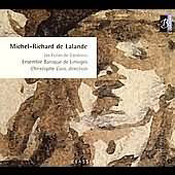Recently in Recordings
The Gran Teatre del Liceu in Barcelona, after suffering a calamitous fire in the early 1990s, reopened in 1999, lovingly restored. TDK has released a series of DVDs from the Liceu since that date, providing ample evidence of the world...
Premiered posthumously, the symphonic song-cycle Das Lied von der Erde by Gustav Mahler (1860-1911) remains one of his defining works because of its synthesis of song and symphony, two genres he pursued throughout his career.
In 1851 during his first season as music director in Düsseldorf, Robert Schumann presented a performance of Bach’s St. John Passion, and unsurprisingly adapted the score both to nineteenth-century taste and nineteenth-century practicalities.
In tandem with the recently released set of Sir Simon Rattle’s recordings of Mahler’s symphonies on EMI Classics, the set of the complete symphonies by Jean Sibelius merits attention.
As much as Richard Wagner espoused opera reform in his theoretical writings by bringing to his works for the stage a closer unity between music and text, his actual means of doing so at times involved the use of orchestral forces that sometimes overwhelmed the sung word.
The budget label Gala purveys live performances both historic and relatively recent; of the three discussed here, the La Scala Fedora dates back to 1931, while the Attila comes from a 1987 La Fenice performance.
National styles of music in the seventeenth century were often distinctive, and in the case of French and Italian music, famously so.
With its recent release of Mahler’s symphonies conducted by Sir Simon Rattle, EMI Classics makes available in a single place an outstanding contribution to the composer’s discography.
This DVD records and commemorates a 1981 production of Parsifal in its Bayreuth lair, and the singers of 1981 are as fine as recollection might paint them.
Once the custom of the world's opera houses was to translate great operas into the language of each respective country.
Repackaging older recordings having become the primary focus of a classical recording company's business, Deutsche Grammophon budgeted some funds for art direction for its budget series called "Opera House" (although that appellation only appears in a link found on the back inside cover of the sets' booklets).
Of Rosenkavaliers on DVD, the classics tend to be lovingly detailed productions, going back to the film of Herbert von Karajan leading an exemplary cast, with Elizabeth Schwarzkopf's iconic Marschallin.
Despite an unsurprising degree of conservatism in liturgical music, devotional life in Rome often found ways of taking advantage of modern musical style.
“Her fioritura is priceless, breathtaking, and effortless.”
The English composer Nicholas Maw has been a major voice since the 1960's, with a wide range of works that include the 2002 opera, "Sophie’s Choice," a violin concerto for Joshua Bell (1993), and the monumentally-scaled orchestral work, "Odyssey" (1972-87).
As is often the case, last works that remain incomplete at the time of a composer’s death, are quick to invoke controversy and conspiracy theories.
This is a valuable new recording of a work that is only rarely heard, but was widely influential and wildly popular during the eighteenth century. Philosophe Jean-Jacques Rousseau wrote both the libretto and the music, with mixed success.
This disc is well worth the price for the first track alone: the opening measures of Jean-Féry Rebel’s “Cahos,” (Chaos), written in 1737 or 1738, may cause you to wonder if you accidentally left a Stockhausen or Ligeti disc in the changer.
This recording made half a century ago will not be anyone’s first choice unless one is a die-hard fan of one of the principal singers; neither of them belonging to the absolute top in their profession.
Why should anyone buy a German language broadcast of a delicious French opéra-comique?
Recordings

03 Feb 2008
DE LALANDE: Les Folies de Cardenio.
The centrality of dance at the French court helped bring grace, order, and political allegory into the characteristic prominence they enjoyed during the reigns of Louis XIV and Louis XV; theatre presentations of all stripes were infused with choreographic diversions.
The present recording presents the dance music by Michel-Richard de Lalande for the comedie-ballet Les Folies de Cardenio by Charles-Antoine Coypel, performed in 1720/21.
The performances by Ensemble Baroque de Limoges are stylish, played with engaging rhythmic lilt, poise, and, where invited, convincing characterization. Characterization particularly comes into play with the exotic dances, such as the “Air pour les Chinois” and the “Air pour les Pagodes,” both using imaginative scorings and, in the case of the Chinese air, col legno battuto, all to good effect. In dances like the “Air des Combattants,” the percussion—one of the delights of the recording, in general—recreates the clank of sword play in an congenially dramatic touch. Many of the dances are rather more generic, however, and this raises a question about the program itself.
The recording isolates the dances from a theatrical context and from the visual partnership with dancing, and it asks a lot of a succession of short, often generic pieces to stand alone, as the recording requires. Of the forty-one tracks, only one, the overture, is longer than three minutes; many are under a minute in duration. No matter how splendid the performances or how charming the pieces, this many miniatures strung together for nearly an hour will frustrate attentive listening to the whole; the transplant from the context-rich, original environment to the audio isolation of the CD is a difficult one and imposes demands on the music that seem foreign to its nature. Taken as an “archive in sound”—“these are the dances for Les Folies de Cardenio”—the recording is a successful document, without question. Taken as a program, however, I recommend smaller doses to maximize the delight.
Steven Plank
